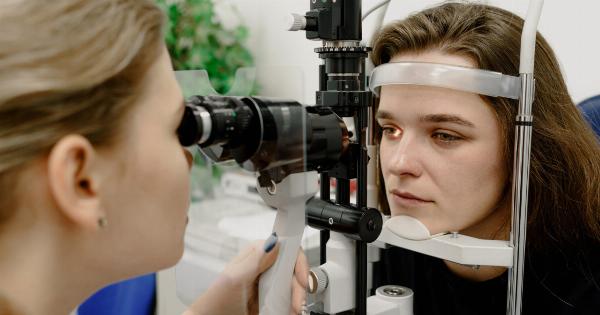Blurred vision is a common symptom that can occur for a variety of reasons. It can be a temporary or permanent condition, and the severity of the blurriness can range from mild to severe.
In this article, we will discuss the symptoms, causes, and treatment options for blurred vision.
Symptoms of Blurred Vision
Blurred vision can present in different ways, depending on the underlying cause. Some people may experience intermittent blurriness, while others may have a constant, steady blurred vision. Other symptoms that may accompany blurred vision include:.
- Eye pain or discomfort
- Headaches
- Eyestrain or fatigue
- Difficulty seeing at night or in dim lighting
- Sensitivity to light
- Dry or watery eyes
- Double vision
Causes of Blurred Vision
There are many reasons why someone may experience blurred vision. Below are some of the most common causes of blurred vision:.
Refractive errors
Refractive errors, such as nearsightedness, farsightedness, and astigmatism, can cause blurred vision. In these cases, the shape of the eye prevents light from focusing properly on the retina, resulting in blurry vision.
Cataracts
Cataracts occur when the lens of the eye becomes cloudy, resulting in blurry vision. Cataracts are typically associated with aging, but they can also be caused by eye injuries or certain medical conditions.
Glaucoma
Glaucoma is a group of eye diseases that can cause damage to the optic nerve and lead to vision loss. In some cases, it can cause blurred vision or tunnel vision.
Diabetes
This chronic condition can cause damage to the blood vessels in the eyes, leading to a condition called diabetic retinopathy. Diabetic retinopathy can cause blurry vision, floaters, and even blindness if left untreated.
Macular degeneration
This condition occurs when the macula, the part of the eye responsible for central vision, begins to deteriorate. Macular degeneration can cause blurred or distorted central vision.
Dry eye syndrome
Dry eye syndrome occurs when the eyes do not produce enough tears or when the tears evaporate too quickly. This can cause uncomfortable symptoms such as dryness, itching, burning, and blurred vision.
Treatment Options for Blurred Vision
The treatment for blurred vision depends on the underlying cause. In some cases, such as refractive errors, glasses or contact lenses can correct the issue.
In other cases, such as cataracts, surgery may be necessary to remove the cloudy lens and replace it with an artificial one.
If the cause of blurred vision is related to an underlying medical condition such as diabetes or high blood pressure, treating the condition itself may help alleviate the symptoms.
Other treatment options include prescription eye drops, lifestyle changes (such as quitting smoking or adjusting your diet), or vision therapy.
Preventing Blurred Vision
While some causes of blurred vision are beyond our control, there are steps we can take to maintain good eye health and prevent vision problems. Some tips for preventing blurred vision include:.
- Getting regular eye exams
- Eating a healthy and balanced diet
- Wearing protective eyewear when necessary
- Practicing good eye hygiene, such as washing your hands before touching your eyes
- Avoiding smoking and limiting alcohol consumption
- Taking regular breaks when working on a computer or performing other visually demanding tasks
When to See a Doctor
If you are experiencing blurry vision, it is important to see a doctor to determine the underlying cause and receive appropriate treatment. Other signs that you should see a doctor include:.





























